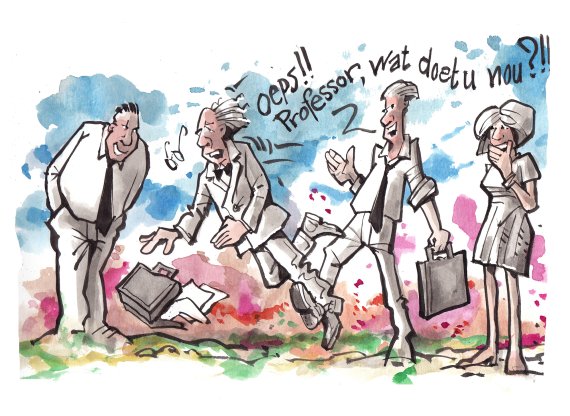illustration Henk van Ruitenbeek
Philippe Puylaert,
Lab coordinator at Microbiology

‘I’ve never come across it in the seven years I’ve been working here. Of course you get some teasing, but that is clearly not the same as bullying. When it’s teasing, the person can handle it, and can give as good they get. I think people who go too far realize that themselves. Sometimes something can be taken the wrong way. Like the time after a football final when a colleague put on a shirt of the winning team to tease another colleague who was a supporter of the losing team. That didn’t go down very well. But he was OK again the next day. I don’t think we get bullying here because we are a big group and you can easily get away from people you don’t get on with. What is more, there is a high staff turnover.’
Bob Mulder,
Teacher of Strategic communication

‘I think you can be sure there is bullying in Wageningen as well, just based on the large numbers of people working here. I don’t see it happening myself. And that is one of the problems with bullying: it often goes on invisibly, through asides for example. The difference between bullying and teasing depends on the context, which affects the way a comment is taken. And I don’t think bullies are always aware of the impact they’re having. Sometimes people don’t quite know what attitude to take when someone isn’t part of their own little group. A woman or a homosexual, for instance, in a man culture. Then people crack jokes in an attempt to release the tension. It would be a good idea for the bullied person to talk afterwards to the one who cracked the joke. But it’s not easy to do that.’
Ingrid Lammerse,
Director Corporate HR

‘There is no bullying on campus. In the six months I’ve been at Wageningen UR I have seen no signs of bullying behaviour. HR is involved as soon as there is a complaint about bullying. I don’t hear much about bullying either, but it is difficult to find out whether someone is being bullied or not. It’s up to people themselves to determine whether they feel bullied or mistreated. As soon as someone feels bullied, talk about it! Otherwise colleagues don’t realize they are bullying.
René Hoevenaren,
Corporate social worker

‘I don’t agree with the statement. I know it goes on, especially in subtle forms of exclusion. Wageningen UR has a clear and thorough policy on bullying, but that doesn’t mean it doesn’t happen. There is a thin line between teasing and bullying. Humour should never be at the expense of just one person. So if you make a ‘joke’, look at whether the other person really can laugh about it too. In a nasty atmosphere ‘humour’ quickly turns cynical, which makes people feel insecure. The confidential advisors and corporate social workers support staff who feel excluded or bullied. The trickiest situations are those in which managers themselves create insecurity or are not open to feedback. It is very important for colleagues to be able to tell their boss how they feel.’
Ingrid van der Meer,
Business unit manager at Bioscience and confidential advisor

‘A lot of people think bullying is something that only goes on between schoolchildren but that is not true at all. Bullying takes place in all age groups, all social classes and every organization. And sadly, it happens in Wageningen UR just as it does in all other workplaces. It is not tolerated here, though. Both managers and colleagues are expected to do something about it if they notice it. For a confidential advisor, incidentally, it is very important to know how the person reporting antisocial behaviour experiences it themselves and to look for a way of tackling it together with them. It is not always meant as bullying but it can be experienced as such.’
Hanne van der Kooij,
PhD candidate at Physical chemistry and soft matter

‘Bullying is found among all population groups and in all periods of time. So there must be bullying in Wageningen University too. But I have never witnessed it in the eight years I’ve been studying and working in Wageningen. Teasing goes on of course, but in my view that’s just a sign that people get on well, so it’s a positive thing. You bully someone because you want to get at them. I think bullying is less common in Wageningen than the national average rate of one in six. I think that’s because it doesn’t fit in Wageningen’s culture. Wageningen has a soft image so it attracts fewer hard, competitive types. Partly because of the kinds of degree courses offered here too. That’s reflected by the PhD candidates and postdocs too.’

